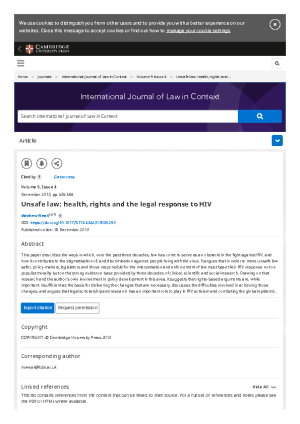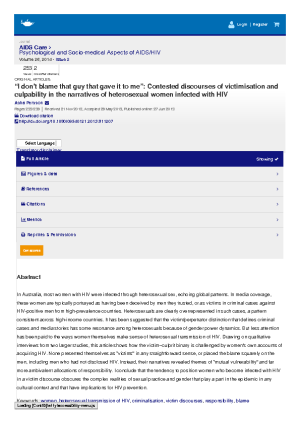Unsafe law: health, rights and the legal response to HIV
Suggests that, while important, rights-based arguments are an insufficient basis for advocacy, with legal scholarship and research having an important role to play. Argues that policy-makers, legislators and those responsible for interpretation and enforcement of law must base their HIV response not on populist morality but on the strong evidence base provided by three decades of clinical, scientific and social research.
HIV is Not a Crime
Introduces HIV criminalization through the experiences of three people who were prosecuted for HIV crimes.
- Alternative links
- HIV is Not a Crime - Spanish Subtitles
“I don’t blame that guy that gave it to me”: Contested discourses of victimisation and culpability in the narratives of heterosexual women infected with HIV
Considers how heterosexual women living with HIV make sense of their HIV acquisition, challenging the victim–culprit binary. None of the women interviewed presented themselves as ‘victims’ in any straightforward sense or placed the blame squarely on the men who likely infected them, including men who had not disclosed. Instead, the women’s narratives revealed themes of “mutual vulnerability” and far more ambivalent allocations of responsibility. The tendency to position women who become infected with HIV as ‘victims’ obscures the complex realities of gender and sexual practice.
Disparate risks of conviction under Michigan’s felony HIV disclosure law: An observational analysis of convictions and HIV diagnosis, 1992-2010
Found uneven application of HIV criminalization laws in the state of Michigan, with black men and white women having a comparatively greater risk of conviction than white men or black women. White women had the highest conviction rate of any group analysed, suggesting they may face a particular burden under these laws. Many of the white women convicted were especially disadvantaged by issues such as poor mental health, substance abuse and homelessness.



